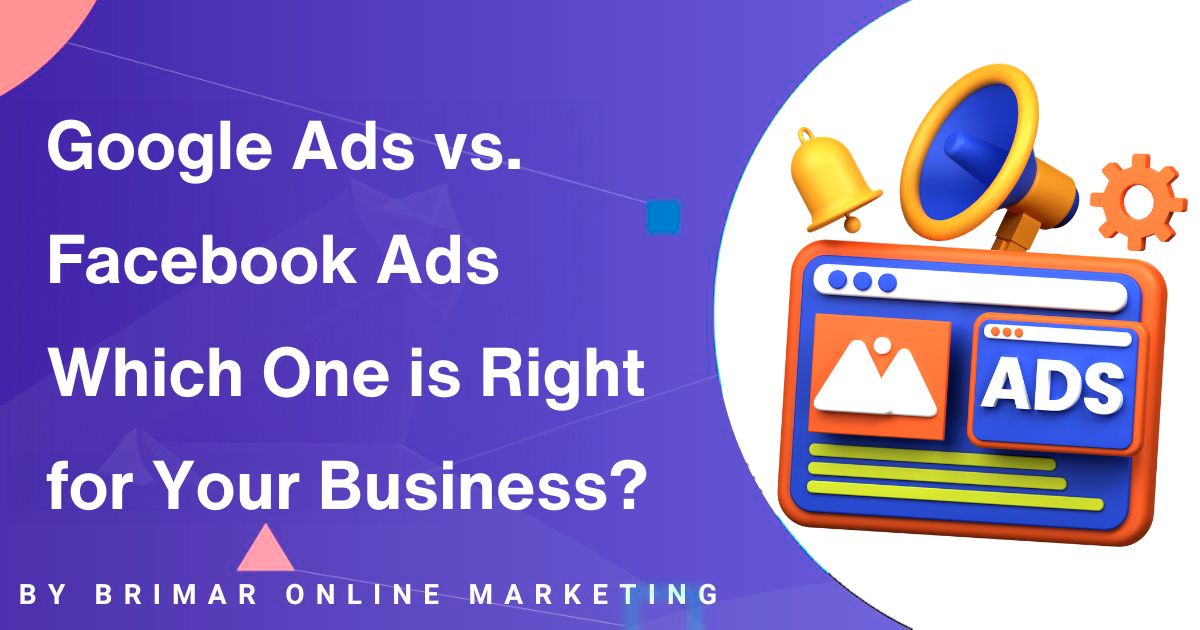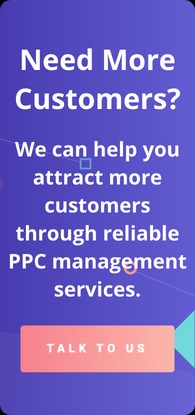
Regarding online advertising, Google Ads and Facebook Ads are two of the most powerful platforms.
Both offer massive reach, but they operate in very different ways.
Google Ads focuses on people actively searching for products or services, while Facebook Ads excels at targeting users based on their interests, behaviors, and demographics.
Choosing the right platform depends on what you want to achieve.
If your goal is to capture leads or sales from people already searching for a solution, Google Ads might be the way to go.
On the other hand, if you want to build brand awareness and reach potential customers before they even realize they need your product, Facebook Ads can be a game-changer.
This guide will break down the key differences between the two, covering cost, effectiveness, and audience targeting so that you can make the best decision for your business.
How Do Google Ads and Facebook Ads Work?
Google Ads: The Power of Search Intent
Google Ads operates on a pay-per-click (PPC) model, meaning you only pay when someone clicks on your ad.
What makes Google Ads so effective is that it targets search intent, people who are actively looking for something specific.
If someone types “best running shoes for flat feet” into Google, they’re already interested in buying, which makes Google Search Ads an ideal way to get in front of those high-intent users.
Google Ads campaigns can run across multiple formats, including:
- Search Ad: Text-based ads that appear on Google’s search engine results pages (SERPs) when users search for specific keywords.
- Shopping Ad: Perfect for eCommerce businesses, these ads display product images, prices, and reviews at the top of search results.
- YouTube Ads: Video ads that appear before, during, or after YouTube videos, great for storytelling and brand exposure.
- Google Display Network (GDN): Visual ads on millions of websites, apps, and YouTube to create brand awareness.
Because Google Ads capture users at the moment they are searching, they tend to have higher conversion rates for businesses that rely on immediate customer action.
Start Attracting Customers Through PPC Advertising Today!
We can help you create PPC campaigns that attract customers. Our services include bid management, keyword management, landing page performance reviews, and more.
Facebook Ads: The Power of Social Media Advertising
Unlike Google, where people search for solutions, Facebook Ads focus on reaching people before they start searching.
Businesses can use Facebook’s detailed audience targeting to reach the right people based on their demographics, behaviors, and interests.
For example, if you sell luxury watches, you can target users with higher income levels, those who follow luxury brands, or even people celebrating a life event like an anniversary.
Facebook’s algorithm learns from user behavior, helping businesses show ads to people most likely to engage.
Facebook offers a variety of ad formats designed for engagement:
- Carousel Ads: Showcasing multiple products in a single ad, great for eCommerce and storytelling.
- Video Ads: Captivating video content that grabs attention and increases engagement.
- Lookalike Audiences: Expanding reach by targeting users who share characteristics with your existing customers.
- Image Ads: Simple, eye-catching ads that fit naturally into users’ feeds.
Facebook ads are an excellent choice for long-term customer acquisition because they allow businesses to build brand awareness, nurture leads, and retarget past visitors.
Google Ads and Facebook Ads serve different purposes, but both can drive impressive results when used strategically.
The next step is to understand their cost-effectiveness, audience targeting, and best use cases so you can decide which platform best aligns with your marketing goals.
Key Differences Between Google Ads and Facebook Ads

Regarding online advertising, Google Ads and Facebook Ads are two of the most powerful platforms, but they work differently.
Choosing the right one depends on how you want to reach your audience and what results you want.
Search Intent vs. Interruption-Based Advertising
The most significant difference between these platforms is how people discover your ads.
- Google Ads: Targets users actively searching for a product or service. If someone types “best painting services near me” into Google, they already have the intent to hire a painter. This makes Google Ads a great tool for capturing leads who are ready to take action.
- Facebook Ads: Uses an interest-based approach. Instead of waiting for someone to search, Facebook places ads in front of users based on their interests, demographics, and behaviors. It’s great for brand awareness, storytelling, and reaching potential customers who might not be actively searching but could still be interested.
Which is better for small business owners?
- Google Ads is best for converting search traffic into paying customers. Since people are already looking for what you offer, there’s a higher chance they’ll take action.
- Facebook Ads is perfect for building brand awareness and engaging a broader audience. It works well for businesses wanting to stay top-of-mind and nurture potential buyers.
Ad Placement and Variety of Ad Formats
Both platforms offer multiple ways to showcase your ads, but the formats differ significantly.
- Google Ads: This program primarily focuses on text-based search ads but also includes shopping ads, display ads, and YouTube video ads. Ads appear in search results, on websites within Google’s Display Network, and even in YouTube videos.
- Facebook Ads: Offers a broader range of creative formats, including image ads, carousel ads, video ads, story ads, and even messenger ads. These formats allow for more engagement, storytelling, and interaction than Google’s text-based approach.
Which one gives more variety?
- Facebook Ads wins when it comes to engagement and creativity. If your product or service is highly visual, Facebook’s ad formats allow you to showcase it more effectively.
- Google Ads is more straightforward, focusing on intent-driven clicks rather than engagement.
Targeting Capabilities: Specific Keywords vs. Specific Audiences
- Google Ads: Uses keyword targeting. With Google’s Keyword Planner, you bid on specific search terms, ensuring your ad appears when people actively look for your product or service.
- Facebook Ads: Focuses on audience-based targeting. Instead of relying on keywords, Facebook analyzes demographics, interests, and behaviors to place ads in front of the right people.
Which one is more precise?
- Google Ads is the better choice for targeting people actively searching for a specific product or service.
- Facebook Ads are more potent if you want to reach a defined audience based on lifestyle, interests, and online behavior.
Cost Comparison: Which One Has a Lower Cost?
- Google Ads: Typically has a higher cost per click (CPC), but the conversion rate is usually higher because it’s intent-driven. This means you’re paying more per click, but those clicks are more likely to turn into leads or sales.
- Facebook Ads: Generally has lower CPCs, making it a cost-effective option for businesses with smaller budgets. However, because it’s interruption-based, conversions may take longer, as people don’t always take immediate action.
Which one provides better results?
- Google Ads is great for businesses that want to drive immediate conversions and can afford a higher CPC.
- Facebook Ads is better for brand building and engagement, allowing businesses to nurture leads over time.
The best choice depends on your goals.
If you’re looking for fast, high-intent traffic, Google Ads is the way to go.
Facebook Ads is a smarter investment if you’re playing the long game with brand awareness and audience building.
Both platforms have their strengths, and the right choice is what works best for your business goals and budget.
Using a mix of both can maximize your reach and ROI if possible.
Which Ad Platform Is Best for Your Business?

With so many ad platforms available, choosing the right one can feel overwhelming.
Each platform has strengths depending on your business goals, target audience, and budget.
Whether you’re looking to drive sales, increase brand awareness, or attract potential customers, here’s how to pick the best fit for your business.
For Small Businesses with Budget Constraints
Every dollar needs to count if you’re working with a limited budget.
Facebook Ads is one of the most cost-effective options to test different audiences, generate leads, and build awareness.
- Lower ad costs than other platforms make it easier to start small and scale.
- Highly detailed targeting, allowing you to reach specific demographics, interests, and behaviors.
- Best for small businesses looking to increase engagement and establish an online presence without spending thousands upfront.
For Businesses Focused on Sales and Search Intent
If your goal is immediate conversions, Google Ads is the way to go.
When users type a query into Google Search, they actively seek a product or service, making them high-intent buyers.
- Pay-per-click (PPC) model means you only pay when someone clicks your ad.
- Appears directly on Google Search results, targeting users ready to buy.
- Best for businesses that rely on capturing leads and making sales through search engine results pages (SERPs).
For eCommerce and Online Stores
Running an online store?
The right ads can make a massive difference in driving product sales.
- Google Shopping Ads are ideal for businesses selling physical products. They showcase your product images, prices, and details directly in search results when users look for a specific product.
- Facebook Ads can also work well for eCommerce by targeting users based on their shopping behaviors and interests. Retargeting campaigns help you reach people who have browsed your site but haven’t purchased yet.
Combining Google Shopping and Facebook Ads can provide maximum exposure and higher conversions for online stores.
For Brand Awareness and Social Engagement
Not every campaign needs to focus on immediate sales.
Social media is the place to be if you want to boost brand awareness and engage potential customers.
- Facebook Advertising is excellent for storytelling, video content, and interactive engagement with Facebook users.
- Instagram Ads are perfect for visually-driven brands, especially those targeting younger audiences. They work well for fashion, beauty, lifestyle, and brand-building campaigns.
If your goal is to get people talking about your brand, social media platforms like Facebook and Instagram offer the best opportunities for engagement.
Choosing the Right Platform for Your Business
Every business is different, and the best ad platform depends on what you’re trying to achieve.
Facebook Ads is a great starting point if you’re on a tight budget.
If you need quick sales, Google Ads can connect you with high-intent buyers.
And if you want to increase brand awareness, social media platforms will help you reach a wider audience.
Whichever platform you choose, the key to success is testing and optimizing.
Start small, analyze the results, and adjust your strategy to get the best return on investment.
How to Get the Best Results from Your Advertising Campaigns

Running ads is one thing; getting real results is another.
A successful campaign isn’t just about spending money; it’s about optimizing every detail to drive more clicks, conversions, and revenue.
Whether you’re using Google Ads or Facebook Advertising, the right approach can mean the difference between a wasted budget and a campaign that pays for itself many times over.
Optimizing Google Ads Campaigns
Google Ads can put your business in front of potential customers who are actively searching for your products or services.
But to make every dollar count, you need a strategy beyond just bidding on keywords.
- Use specific keywords with high click-through rates for better results. Broad terms may bring in traffic, but high-intent keywords with proven click-through rates (CTR) ensure you attract the right audience of people ready to take action. Tools like Google’s Keyword Planner and third-party platforms can help identify high-performing keywords for your campaigns.
- Leverage Google’s Display Network for remarketing and broadening reach. Not everyone converts the first time they visit your site. Remarketing campaigns allow you to stay top-of-mind by displaying targeted ads to users who have already interacted with your brand. This strategy re-engages visitors, encouraging them to return and complete their purchase or inquiry.
- Set up effective landing pages with strong conversion tracking. A poorly optimized landing page will kill your ad campaign, even if your ads are top-notch. Ensure that every ad leads to a dedicated landing page with a compelling offer, clear call-to-action (CTA), and fast load speed. Proper conversion tracking helps measure results accurately so you know what’s working and what needs improvement.
Maximizing Facebook Advertising Success
Facebook Ads can help you reach a wider audience, but getting the best results requires more than boosting a post.
You need a structured approach that fine-tunes every element of your campaign.
- Experiment with various ad placements and formats to determine what is most effective best. Facebook offers multiple placements, News Feed, Stories, Reels, Messenger, Audience Network, and Instagram. Some audiences respond better to short, engaging videos, while others prefer static images or carousel ads. Run A/B tests to determine the best-performing format for your audience.
- Use lookalike audiences to expand your reach and refine your targeting. If you already have a list of engaged customers, lookalike audiences allow you to reach new people with similar characteristics. This increases the success rate of your ads by focusing on users who are more likely to engage, click, and convert.
- Track performance metrics and adjust campaign objectives accordingly. Facebook provides deep insights into ad performance, from engagement rates to cost-per-click (CPC) and conversion rates. Monitor key metrics regularly and make adjustments, whether tweaking your targeting, adjusting ad creative, or refining audience segmentation, to maximize return on investment (ROI).
Ads work best when every element is optimized, from keywords and target audiences to ad placements and landing pages.
The best thing you can do is continuously test, refine, and scale what’s working.
With the right link building tactic,search rankings, and advertising strategy, you can turn clicks into conversions and drive real business growth.
Wrapping Up
There’s no universal “best” regarding Google Ads vs. Facebook Ads; the right choice depends on your goal.
Both platforms offer unique strengths, and knowing when to use each can make all the difference in your advertising success.
- Looking for high-intent traffic? Google Ads is your best bet. People actively searching for products or services are more likely to convert, making Google Search ads an excellent option for capturing demand.
- Want to expand your reach and build relationships? Facebook Ads offers powerful targeting, allowing you to connect with potential customers based on their interests, behaviors, and demographics. It’s a great way to increase brand awareness and engage with a wider audience.
- Why not use both? The best digital marketing strategy often includes a mix of both platforms. Google captures people actively searching, while Facebook helps you stay top-of-mind with potential customers, even before they start looking for your services.
Start small.
Test a modest budget on both platforms, track your conversion rates, and analyze your cost per lead.
Use that data to refine your approach, whether shifting more budget to the platform delivering better results or adjusting your targeting for a higher return on investment.
The more you test and optimize, the better your campaigns will perform.
Our PPC Services Have Helped Our Clients Increase Their Revenue!
“I highly recommend Brimar if your looking to grow your online business. You will be satisfied with the high level of expertise and high quality of services. It has helped my business grow by leaps and bounds.”
CEO
